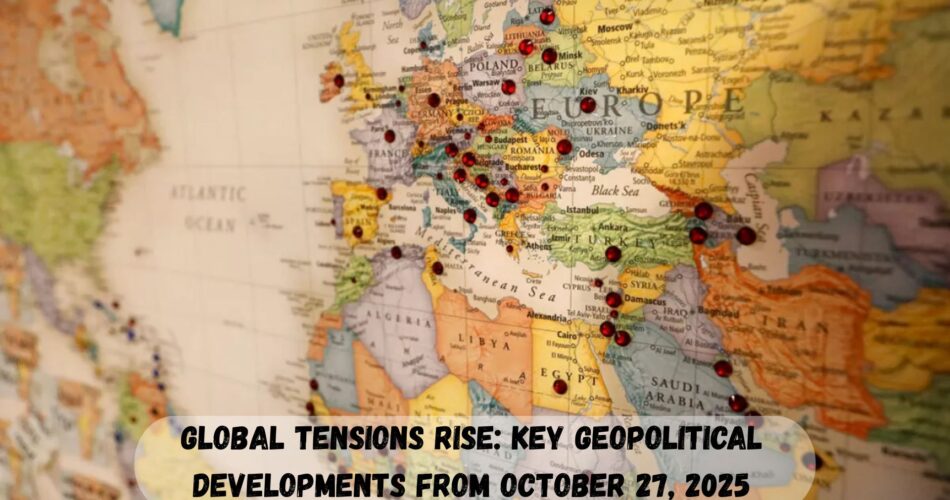The past 24 hours have seen major geopolitical tensions across several regions—from Venezuela’s accusations against the United States to renewed threats of conflict between Pakistan and Afghanistan. Meanwhile, Europe faces new political debates over energy ties with Russia, and Argentina experiences a political shift following sweeping midterm victories. Here’s a detailed look at the day’s major developments.
- Maduro Accuses U.S. of “Fabricating” War Against Venezuela
- Pakistan Warns of ‘Open War’ with Afghanistan if Peace Talks Fail
- Polish PM Warns Against Renewed Ties with Russia
- Argentina’s Milei Celebrates Landslide Midterm Victory
- U.S. Navy Jet and Helicopter Crash in South China Sea
- U.S. and China Reach Framework for Trade Deal
- Conclusion
Maduro Accuses U.S. of “Fabricating” War Against Venezuela
Venezuelan President Nicolás Maduro accused the United States on Sunday of “fabricating” a war against his country after the USS Gerald R. Ford aircraft carrier was reported approaching the Caribbean region.
In a televised address, Maduro claimed that Washington was “provoking military tension” and announced legal action to revoke opposition leader Leopoldo López’s citizenship for allegedly supporting a U.S.-backed military intervention.
The Venezuelan government has frequently accused the U.S. of orchestrating regime change operations, while Washington maintains its naval deployment is part of routine regional patrols.
Pakistan Warns of ‘Open War’ with Afghanistan if Peace Talks Fail
Pakistan’s Defence Minister Khawaja Muhammad Asif warned that the country could face an “open war” with Afghanistan if ongoing peace efforts collapse.
The statement came after technical-level talks in Istanbul on Saturday between officials from both nations aimed at consolidating the Doha ceasefire agreed upon last week.
Asif emphasized that Pakistan’s patience is “wearing thin” amid cross-border tensions and rising attacks attributed to Afghan-based militants.
Background
- The Doha ceasefire, brokered earlier this month, aimed to reduce cross-border violence.
- Pakistan has accused the Tehrik-i-Taliban Pakistan (TTP) of operating from Afghan territory.
- The Taliban government in Kabul has denied harboring militants, calling for diplomatic solutions.
Polish PM Warns Against Renewed Ties with Russia
Polish Prime Minister Donald Tusk cautioned European leaders that the end of the Russia-Ukraine war could spark renewed efforts to restore economic ties with Moscow.
Speaking at a press conference in Warsaw, Tusk described proposals to restart the Nord Stream 2 gas pipeline as an “alarm bell,” warning that Europe must avoid becoming dependent on Russian energy again.
Tusk’s remarks reflect growing unease in Eastern Europe that Western nations may prioritize economic recovery over long-term security once the conflict ends.
Argentina’s Milei Celebrates Landslide Midterm Victory
President Javier Milei and his La Libertad Avanza party scored a decisive victory in Argentina’s midterm elections on Sunday, gaining nearly 41% of the national vote.
Election Results Summary
| Category | Seats Won | Total Contested |
|---|---|---|
| Senate | 13 | 24 |
| Lower House | 64 | 127 |
The results strengthen Milei’s hand in pursuing radical fiscal reforms, including spending cuts and market deregulation, which have faced resistance from opposition lawmakers.
Analysts say the outcome marks a turning point in Argentina’s economic policy, giving the president more control over his legislative agenda.
U.S. Navy Jet and Helicopter Crash in South China Sea
A U.S. Navy F/A-18 Super Hornet fighter jet and a MH-60 Seahawk helicopter crashed into the South China Sea within 30 minutes of each other on Sunday during operations from the USS Nimitz.
All five crew members were rescued and are reported to be in stable condition.
The U.S. Navy said the incidents were not related and are under investigation.
The South China Sea remains a region of heightened tension, with frequent military operations by the U.S., China, and regional allies.
U.S. and China Reach Framework for Trade Deal
In a breakthrough development, the United States and China have reached a framework agreement ahead of a scheduled meeting between former U.S. President Donald Trump and Chinese President Xi Jinping in South Korea.
The agreement reportedly removes the threat of 100% tariffs on Chinese imports that were set to begin November 1. It also includes a final deal regarding the sale of TikTok’s U.S. operations, which had been a point of contention between the two countries.
Analysts view the deal as a step toward stabilizing economic relations after years of trade disputes.
Conclusion
From South America’s political shifts to Asia’s escalating military and diplomatic standoffs, the last 24 hours have underscored the volatility shaping global politics in late 2025. As nations navigate competing interests and emerging alliances, the outcomes of these developments—from Venezuela’s standoff with the U.S. to Pakistan’s warning to Afghanistan—could define the next phase of international relations in the months ahead.

